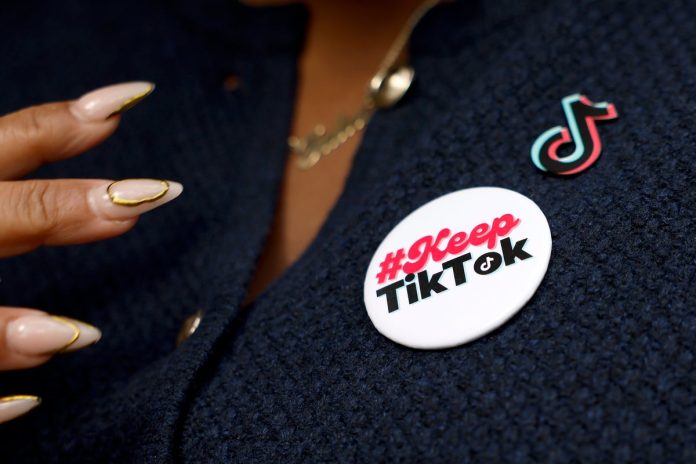January 15, 2025
3 min read
Why Are U.S. TikTok Users Signing Up for RedNote?
Thousands of U.S. TikTok users are joining China-based app RedNote, spawning memes, jokes and confusion
A TikTok creator and advocate wears a button showing support for TikTok. Other users have flocked to alternative apps, such as China-based RedNote.
Kevin Dietsch/Getty Images
In reaction to—or protest over—the impending U.S. TikTok ban, which will take effect on Sunday if the app is not sold or if the Supreme Court doesn’t intervene, thousands of people in the country have joined RedNote. The latter is a China-based e-commerce and lifestyle app that is also known as Xiaohongshu, Mandarin for “Little Red Book”—which is also a nickname for the famous book of quotations from Mao Zedong. About 300 million people, mainly in China, use RedNote for video and image sharing, shopping and travel recommendations.
This week RedNote climbed to the top of the charts on Apple’s and Google’s U.S. app stores. The potential TikTok ban has so far prompted about 700,000 people to join the Chinese app, according to Reuters. That’s less than 1 percent of the 170 million U.S. users of TikTok, but the influx has been enough to spawn goofy memes and the occasional misunderstanding: a man in Vancouver who welcomed the new arrivals went viral because people mistook him for RedNote’s chief executive.
The rush to this app is an example of the “media substitution hypothesis,” in which people fill a media void with a new platform or network, says Saleem Alhabash, a professor of advertising and public relations at Michigan State University, who studies the psychological effects of social media use. On TikTok, “there is no implicit contract that you have to be an active user,” he points out, unlike arguably more posting-driven platforms such as X (formerly Twitter), Bluesky or Instagram. It’s completely acceptable to passively lurk, scroll and shop on TikTok, and RedNote may be scratching that same itch. “Mix the social with satisfying the need to shop—to buy cheap clothes or exercise equipment—that is the full package, in terms of user experience,” Alhabash says.
On supporting science journalism
If you’re enjoying this article, consider supporting our award-winning journalism by subscribing. By purchasing a subscription you are helping to ensure the future of impactful stories about the discoveries and ideas shaping our world today.
Although TikTok owner ByteDance is based in China, the English version of its app operates in the U.S. through an American subsidiary. RedNote, meanwhile, has a single app with mostly Mandarin content and is headquartered in Shanghai. One result of the recent migration has been a cultural exchange between new users in the U.S. and veteran ones in China: Some Americans on RedNote, for instance, marveled at China’s mass-market electric cars, which aren’t sold in the U.S. because of high tariffs. And Chinese students have sought help with their English homework on the app.
RedNote’s ownership also means that if the app were to take off in the U.S., it would likely be subject to the same kind of national security concerns over data harvesting and content manipulation that TikTok has faced. RedNote, which did not immediately respond to Scientific American’s request for comment, also restricts posts that people would be able to share freely on U.S. platforms. To avoid algorithmic constraints on LGBTQ content, same-sex couples in China typically call themselves “roommates,” according to a 2024 ethnographic study of RedNote and similar apps, or camouflage their digital communities via unconventional hashtags. (Because interest in #ToddlerFood is stereotypically coded as female, queer and lesbian women in China can use it to avoid “men who only care about themselves,” as a RedNote user told the study’s author.)
Whether former TikTok users will migrate from one app to another “in a cultlike manner” is far from certain, Alhabash says. Some people might be convinced to follow their favorite influencers to new platforms, and where those influencers end up could, in turn, be guided by financial prospects or brand support. “There’s more than just an individual decision by the user” at play, he says.
For now, on RedNote, there are jokes. One user who had freshly signed up was greeted by a message from their “new Chinese spy friend.” Others said they were happy to give their data directly to President Xi Jinping or China’s government. And the Los Angeles Times reported that this week nearly 200,000 people joined a RedNote live chat named “TikTok Refugees Club.”






